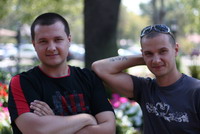Friday, July 18, 2008
Interview with Olexiy and Olexandr Prokhorenko, Atomkeep.com

If you're like most people on the Internet today, you've got multiple profiles on many different social networking and other web sites. Undoubtedly you've come across the problem of having to update those profiles every time something changes. Olexiy Prokhorenko and Olexandr Prokhorenko--who are brothers from the Ukraine--co-founded a Los Angeles-based, seed stage startup called Atomkeep (www.atomkeep.com), which is entirely focused on solving that problem. We sat down with Olexiy and Olexandr the other day to get a quick background on the firm and what it's trying to do. (Photo: on left, Olexandr Prokhorenko, on right, Olexiy Prokhorenko).
What's Atomkeep, and how do people use your site?

Olexiy Prokhorenko: We are about keeping your personal profile, in sync on every site or social network. For example, if you update one, we update it everywhere else. When you update your resume, you don't need to update personal information, education, address, skills more than once. You can update it once, and we will sync it everyone else. It solves the problem of having to update the same information everywhere.
How did you guys get the idea, and why did you start the company?
Olexiy Prokhorenko: Everyone has got this problem. There are all these sites, and we saw the trend that they are becoming niches. People have profiles all over the place, and use them all the time. We came up with the thing when I was starting to use one of the Russian social networks. I came to the profile and saw all the fields I had to fill out, and I said -- what a minute, I just did this for LinkedIn. I thought of just leaving the profile blank, but I wanted to use this network, because I had lots of friends in Russia on this network. I said--come on, there must be some easier way to keep these in sync. I found that there was no way. So now there is one.
What's your background?
Olexiy Prokhorenko: I came to LA about 3 years ago. I was in Chicago, and had a company I started working with here. I'm a technical person, and still do a lot of technical things and code. I've also been in managerial positions, so I've been in two places. I know how to run a business, and do technical things. I'm doing a lot of the coding of this myself, but I've also seen lots of pieces of this, not just the technology. I've worked at everything from small and large companies. What's the same about us, except that we're brothers (laughs) is that we prefer startups.
Olexandr Prokhorenko: We had a few companies back in Ukraine and Russia. We had a telecommunication company and some in infrastructure. I originally had lots of experience as a system administrator, and owned several companies in the Ukraine in this industry. We don't have that much experience in the U.S., but some of our projects have been fairly successful in the Ukraine. We thought, why not try that now in the United States?
What's your view on the difficulty of putting together a project like this with Web 2.0 technology--it seems like it's much easier to do a startup like this nowadays?
Olexiy Prokhorenko: Nowadays it's really easier because you have all this stuff. Back then I remember we had to buy servers, they were something like $5000 each, and it wasn't that you could just take out your credit card and pay for it. But now, it's $15 a month for hosting and you can do anything you want there.
Olexandr Prokhorenko: The problem though is that you have lots of competitors. As soon as someone can come up with the idea, they can make it on their own. A lot of ideas have already been done by someone. Nowadays it's not just about innovation, it's how well you build it.
So how difficult was it to get all these sites to sync--do they all have APIs?
Olexiy Prokhorenko: We still have to use web standards like HTML, and those sites know what an HTML form looks like, and we just fill it out for you, just as if you did on the web. There are lots of smaller sites who have contacted us, tell us this is a nice idea, and ask us how they can get us to support them.
I notice a lot of good technical folks from the Ukraine, why is that?
Olexandr Prokhorenko: A lot of people from the former Soviet Union, have a pretty good mathematical education. Because computers were more expensive than over here, they had to think more and their programming skills are very good.
Thanks!